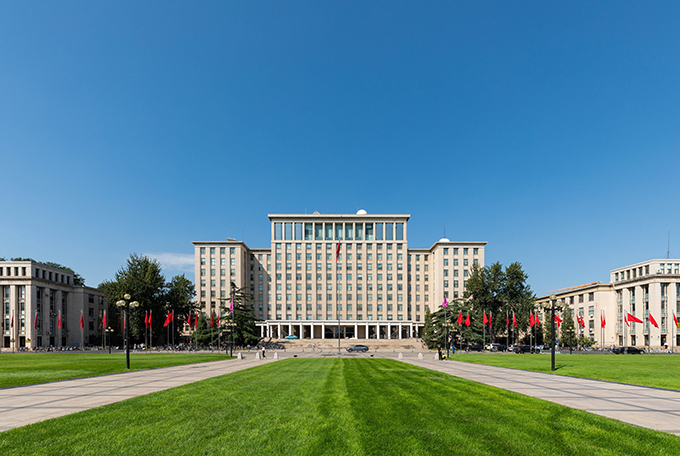 Three Chinese universities declared on May 9 their intention to “withdraw from international rankings” . The announcement, given by national official news outlets, concerns the People’s University (Renmin) in Beijing as well as the universities of Nanjing and Lanzhou, located respectively in the provinces of Jiangsu, in the east of the country, and from Gansu, in the northwest, at the junction of the Tibetan plateau and Mongolia.
If these three universities are recognized in China by their size and their history, their name is more confidential outside the national borders, since they are not part of the “world-class universities”, these world-class establishments evaluated annually by the various international ranking bodies.
The announcements of these universities are an immediate response to the address of the President of the People’s Republic of China during a visit to the University of the People. On April 25, the latter spoke vehemently about the need for China to continue to strengthen the position of its universities to make them world references but “with Chinese characteristics”. Xi Jinping had explicitly declared on this occasion that international academic excellence could not be achieved by following other countries or by adopting foreign models or standards.
Three Chinese universities declared on May 9 their intention to “withdraw from international rankings” . The announcement, given by national official news outlets, concerns the People’s University (Renmin) in Beijing as well as the universities of Nanjing and Lanzhou, located respectively in the provinces of Jiangsu, in the east of the country, and from Gansu, in the northwest, at the junction of the Tibetan plateau and Mongolia.
If these three universities are recognized in China by their size and their history, their name is more confidential outside the national borders, since they are not part of the “world-class universities”, these world-class establishments evaluated annually by the various international ranking bodies.
The announcements of these universities are an immediate response to the address of the President of the People’s Republic of China during a visit to the University of the People. On April 25, the latter spoke vehemently about the need for China to continue to strengthen the position of its universities to make them world references but “with Chinese characteristics”. Xi Jinping had explicitly declared on this occasion that international academic excellence could not be achieved by following other countries or by adopting foreign models or standards.
Standards War
The president’s speech, followed by these three announcements of abandonment of the international ranking system, has not yet had any direct consequences on the policies of other establishments, but it questions the vision of the Chinese Communist Party in terms of education. higher education and research in international competition. Admittedly, the declaration has above all a political and symbolic significance, since one does not decide to “exit” from a classification just as one does not decide to enter it. The university can at best stop providing data to the ranking bodies which will continue in this case to evaluate it from other sources of data such as bibliographic databases, patent databases, Nobel Prize registers, search engines, public surveys . More fundamentally, pushing universities out of international rankings may seem an incongruous decision in the current geopolitical context. Historically absent from the global higher education landscape, China has ten universities in the top 200 of the Times Higher Education rankings in 2022 , with Tsinghua University and Peking University tied for sixteenth place. Seven universities in mainland China are in the top 150 of the QS Rankings . This is a recent and meteoric rise that the Chinese government has strongly supported in order to attract the talents and investments necessary for scientific research in a global economy closely dependent on innovation and R&D. These performances were obtained not only by reforms of the governance and mode of financing of the universities but also by a real world war of the standards which were for a long time those of the American Ivy League or Oxbridge. In the early 2000s, based on the research of a team from Shanghai Jiaotong University, China developed its method and its indicators of excellence, now entrusted to a private operator, the Academic Ranking of World Universities ( AWRU ). It is therefore this so-called “Shanghai” ranking, which since 2003 has upset the traditional balances in the large world market of university reputation.Claim of autonomy
That Xi Jinping sets himself up today as a destroyer of the domination of Western standards may seem ironic since it is precisely China that has imposed the criteria that prevail on a global scale. More quantitative and less focused on reputation and prestige, these criteria have enabled some Chinese universities in twenty years to collaborate as equals with the best universities in the world, to intensify academic exchanges, to recruit Chinese graduate scientists abroad, and especially not to be evaluated on dimensions that they do not control or on which they are fragile, such as academic freedom . Declaring the exit from the rankings thus marks a new stage in the strategy for the development of Chinese higher education and scientific diplomacy with Western powers. Xi Jinping’s message is clear: Chinese academic and scientific development today is less and less dependent on the transfer of knowledge from abroad. Second world economic power , China has less need of the West as a source of legitimacy because its stage of economic and scientific advancement is sufficient to self-declare the excellence of its universities. Thus, the time when it was necessary to influence the criteria of others is over. The country is advancing in its strategy and moving to a higher level. With this call to reject foreign models and standards, Xi Jinping is not only addressing Western countries, but also speaking to the rest of the world. As part of the continuity of the foreign policy of the last ten years, the Chinese president reaffirms his opposition to external interference, especially when it is Western. By using the expression “with Chinese characteristics” moreover, he takes up a habit of Chinese leaders since the establishment of the policy of economic openness by Deng Xiaoping in the 1980s to draw inspiration from foreign examples without having to justify any inconsistencies and above all without allowing any particular model to consider itself as such. Paradoxically, this formula with appearances of closure has been, over the past forty years, a powerful means for China to borrow from abroad in complete freedom.
On June 28, 2021, the 100th anniversary celebration of the CCP at the Olympic Stadium in Beijing. Noel Celis/AFP